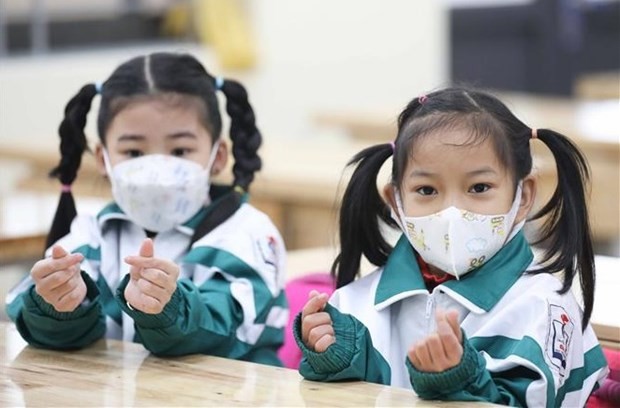
School health care receives due attention
Latest
 |
| First graders in Hanoi's Gia Lam district on their first day at school. (Photo: VNA) |
The programme demonstrates the nation's determination and aspiration to care for future generations.
This is the first step towards a practical, comprehensive and long-term programme on school health on the largest scale ever.
Its target is to ensure comprehensive physical and mental development for children in preschools, special education schools, and students in primary and high schools.
The national programme has set goals for 80 percent of schools to have adequate medicines and equipment as regulated by the Ministry of Health, and 75 percent of schools to provide enough drinking water and clean water for students' activities.
It also sets targets for physical education and sports activities in schools. Accordingly, 80 percent of schools will have at least one area to ensure necessary equipment and tools for physical education and sports activities as prescribed by the Ministry of Culture, Sports and Tourism.
All schools will periodically organise sports competitions in accordance with the law on physical sports; 100 percent of primary and high schools have enough qualified physical teachers who are trained in professional skills.
Targets were set for school meals, ensuring proper nutrition for children, including 100 percent of schools organising lunch at canteens, ensuring hygiene and food safety according to regulations of the Ministry of Health. Students must also be taught about proper nutrition, healthy and safe food.
According to results of the 2019-2020 National Nutrition Census of the National Institute of Nutrition, the proportion of overweight and obese children in Viet Nam increased 2.2 times from 8.5 percent in 2010 to 19 percent in 2020. Nearly 40 percent of school canteens had yet to ensure food safety and hygiene.
At present, more than 40 percent of students have refractive errors, nearly 90 percent of students are suffering dental diseases, and 7-15 percent have scoliosis. These diseases have affected students' ability to study, daily and entertainment activities, and their quality of life, thus leaving long-term consequences.
Therefore, the 2021-25 National School Health Programme clearly outlines the tasks and solutions for the future. One of the important solutions is to upgrade the healthcare facilities and equipment in schools.
Specifically, schools need to be equipped with medical equipment and medicine to ensure the effective implementation of school healthcare work, meeting the requirements of disease prevention and control especially amid the COVID-19 pandemic.
In which, schools will install tables and chairs suitable for students' height, especially children with disabilities; building or repairing clean water works, and sanitation facilities in schools.
The health and education sectors will also be working to strengthen their inspection of school healthcare, including food safety, dental care, optical care and first aid capabilities.
For disadvantaged, remote and mountainous, ethnic minority areas, the Government will give priority and promote the improvement of medical equipment to ensure conditions for teaching and learning, and school meals.














